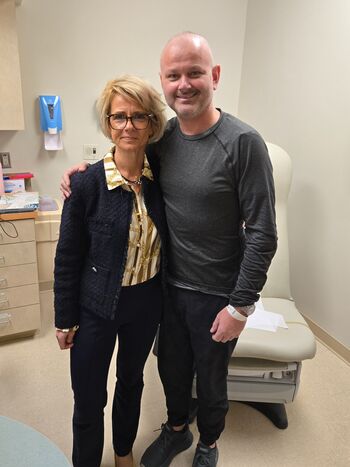Improving Outcomes for Patients With Synovial Sarcoma
When Mihaela Druta, MD, came to the United States in 2001 to finish her medical training, she hadn’t settled on a specialty. The Romanian medical scholar completed an internal medicine residency at the University of South Florida and an oncology fellowship at Moffitt Cancer Center. After finishing her medical training, it was time to choose.
“I was offered a position with the Gastrointestinal Oncology Department to focus on pancreatic cancer, but I didn’t feel it was the best fit. I was more interested in sarcoma,” said Druta, who left Moffitt to complete an additional year of fellowship at MD Anderson focused on sarcoma before returning to Moffitt.
Sarcoma is a rare type of cancer that develops from connective tissues such as bone, muscle, fat or blood vessels. It accounts for less than 1% of all adult cancers, making it much less common. There are many types of sarcomas, broadly categorized into bone sarcomas and soft-tissue sarcomas, each with several subtypes depending on the specific tissue of origin. Not only is it a rare cancer type, but there are also very few physicians who specialize in it. “It’s a small group. We all know one another,” Druta said.
While treatment options like surgery, radiation, chemotherapy, targeted therapy and immunotherapy are available, the rarity and complexity of sarcoma can sometimes limit treatment choices, particularly for advanced or hard-to-treat cases. Although research into new therapies is ongoing, the small patient population and limited number of specialists dedicated to sarcoma mean that developing and delivering new treatments to those who need them often takes considerable time.
A New Option
In August 2024, a history-making new therapy became commercially available to patients with synovial sarcoma, a type of soft-tissue cancer that typically develops near large joints, most commonly around the knees. Afamitresgene autoleucel, commercially known as Tecelra, is the first engineered cell therapy approved by the U.S. Food and Drug Administration for a solid tumor cancer. The T-cell immunotherapy uses a patient’s own cells, which are genetically modified to target the MAGE-A4 antigen in synovial sarcoma cells. Moffitt had enrolled the first patient who participated in the clinical trials that led to the FDA approval.
“What sets Tecelra apart is that it involves a single infusion, not an ongoing regimen like chemotherapy or radiation. The modified cells remain active in the bloodstream, sometimes for more than three years,” Druta said.

As Moffitt’s principal investigator on the clinical trial, Druta’s expertise in sarcoma was key. But she also credits her training at Moffitt, where a deep commitment to cell therapy innovation prepared her to help shape the future of treatment. The cancer center has been at the forefront of cellular immunotherapy, participating in clinical trials that have led to numerous FDA approvals. There is a specific hospital unit, the Moffitt Immune Cell Therapy Unit, dedicated to treating patients receiving this type of therapy.
“I was always fascinated by immunotherapy and cell therapy and what impact it could have in sarcoma. I trained with many of our hematology and bone and marrow transplant experts, who helped usher in new cellular immunotherapies for different blood cancers and saw patients who were receiving these therapies,” Druta said. “The experience was invaluable.”
Moffitt’s collaborative ecosystem sets it apart from other institutions and makes it a frequent destination for companies evaluating new therapies. That’s also why the cancer center is often the first to treat patients following FDA approval of a commercially available therapy.
Another Moffitt Milestone
For JP Malherbe, the new FDA-approved treatment option came almost seven years after he was diagnosed with synovial sarcoma. In November 2017, Malherbe was training for a marathon and had decided to squeeze in a quick run before his family’s Thanksgiving gathering. After his run, while taking a shower, he noticed a lump on his thigh and knew it needed attention. Days later, he was diagnosed.
Scans showed Malherbe, then 34, also had nodules on his lungs. In January 2018, he began a chemotherapy regimen nicknamed the “red devil” for its color and harsh side effects. Radiation followed. By April, the tumor in his leg had shrunk enough to allow surgery. The procedure left him with limited thigh function, and complications soon followed. An infection led to an emergency hip replacement.
JP Malherbe became the first patient in the world to be treated with the newly approved Tecelra in fall 2024. Druta was his doctor.
“I remember after surgery thinking I can’t do anything fun. My life had changed. I went from a full, fast-paced life to completely slowed down because my body did not function as it used to,” Malherbe said. “I could no longer run or ride horses. It hasn’t been easy, but I always remember that there are others who are worse off than me.”
That resilience carried him through the next phase of his cancer journey. He began physical therapy to improve his balance and ability to walk. For years, Malherbe underwent regular scans and treatments to monitor the nodules in his lungs. He has had three lung surgeries to remove cancerous tissue.
“This type of cancer will always be with me. My oncologist has monitored my nodules, and I get treatment when they grow,” Malherbe said.
By September 2024, his nodules were growing again, and treatment options had run out. He was facing palliative radiation when a family friend stepped in. The friend recalled a Moffitt oncologist mentioning a new, first-of-its-kind treatment for synovial sarcoma and encouraged Malherbe to make an appointment.
The physician was Druta, and the treatment was Tecelra. Coincidentally, Malherbe had been screened for this therapy three years prior to meeting with Druta, when the cell therapy was still being evaluated in clinical trials. However, he was not enrolled in the trial because, at that time, his cancer was stable.
Now, he was set to become the first person in the world to receive Tecelra following FDA approval. Despite a brief delay caused by Hurricane Milton, his cells were collected in October 2024 and sent to a lab for modification. In November, they returned to Moffitt. On Thanksgiving Day, seven years after his initial diagnosis, Malherbe received his new cells.
Malherbe recalls feeling fine the day of the infusion but later experienced side effects from the therapy. These side effects, common with cellular immunotherapies, can include flu-like symptoms such as fever, nausea and fatigue.
“Every patient responds differently, which is why we tailor our care and closely track how they’re doing throughout treatment,” Druta said.
Within weeks, Malherbe returned to work. At his three-month scan, the nodules were shrinking. His team remains closely involved in his follow-up care.
More Breakthroughs Ahead
Tecelra may be the first engineered T-cell therapy approved for a solid tumor, but it will not be the last. Moffitt physicians and researchers are evaluating similar approaches for lung, ovarian and prostate cancers. Druta is also investigating additional cellular therapies for sarcoma, determined to expand treatment options for more patients.
“We are in the process of establishing a multi-institutional sarcoma consortium to enhance collaborative research and expedite the translation of scientific discoveries into clinical applications,” Druta said. “This integrated effort allows us to streamline studies, share data more effectively and deliver next-generation therapies to patients more quickly.”





